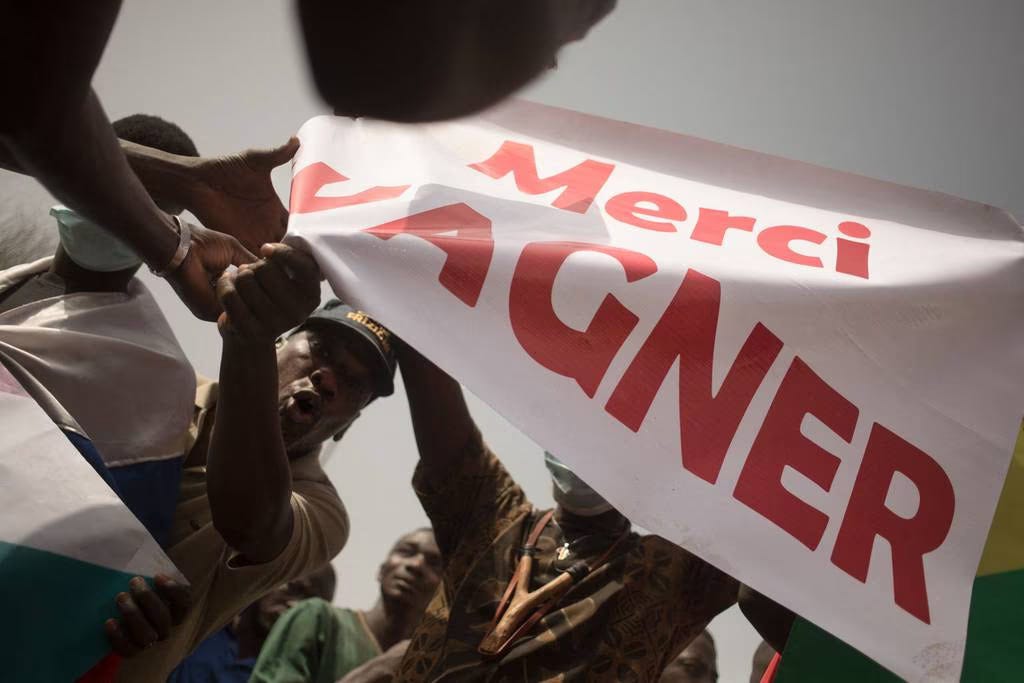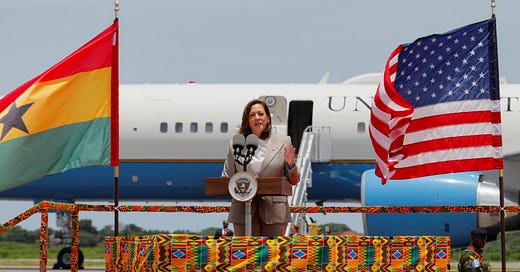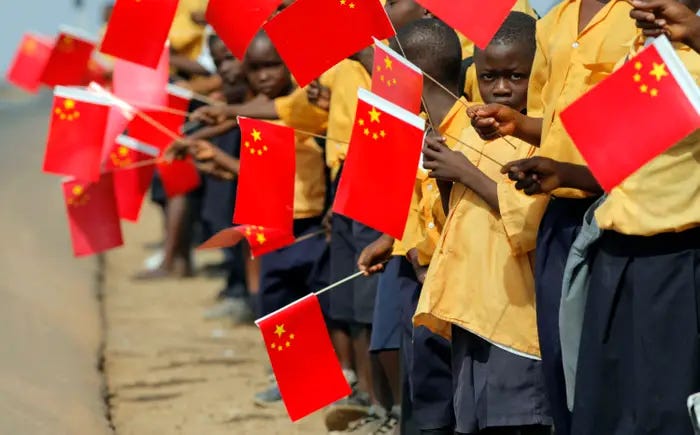West vs. East: the battle for influence in Africa
VP Harris visit to the continent may do very little to win hearts, minds and confidence
U.S. Vice President Kamala Harris is in Africa.
She arrived on the west coast of the continent in the country of Ghana and will continue on her journey east to Tanzania and Zambia.
During her weeklong trip, Harris will announce aid and grants of millions of dollars to support security and governance initiatives in five nations, combat food insecurity due to climate change, increase investment to facilitate economic growth, and provide direct aid to women, girls, entrepreneurs, students and farmers.
As she stepped onto the tarmac, four Ghanaian female dancers performed with a small number of drummers accompanying them. A contingency of young students greeted her in the Akan language with the word “akwaaba” which means welcome.
But geopolitical experts and many Africans question whether America and the West will continue to be welcome in the continent. There have been too stories and clear evidence that the United States is losing its influence in Africa as well as the colonial powers of Europe. Ghana, like other nations in what is called the Global South, is caught between the incessant competition between the West and the East for influence in Africa.
Even at the press conference, a reporter asked Ghanaian President Nana Addo Dankwa Akufo-Addo,if Harris assured him that the purpose of this trip is genuinely about the future of Africa and Ghana and not about competing with China. Harris mentioned that China was discussed but the emphasis of her trip is on the future of Africa.
“Africa basically is ditching the US, that's the bottom line,” said Dr. David Oualaalou of Geopolitical Trends who sees a global race for Africa with the US is a lap behind.
“Why?” asked Oualaalou. “ Because they are not seeing any sort of infrastructure. `They're not seeing anything.”
Through government funding of their private construction companies, China builds infrastructure projects throughout Africa. Hundreds of medical facilities, sports venues, schools, malls, have been constructed with the help of Chinese loans or joint ventures with the local governments.
In Ghana, China’s SinoHydro loaned Ghana US$562 million to build the Bui Dam in Ghana’s Brong Ahafo region which is expected to improve water storage and irrigation along the Black Volta River.
“African leaders always say when the U.S comes to Africa it's always talks about China this, Russia that,” said Oualaalou in his podcast entitled The Global South is Ignoring the US.
“And yet they forget, the American delegation, that the roads they are driving on were constructed by the Chinese. The airport they landed at was built by China.”
A new global order
Throughout Africa there are clear signs of African nations leaving the Western orbit as there is a discernible change in the global order. The East, represented by China and Russia are making substantial inroads to nations which were once completed dedicated to serving the West. The writing is on the wall that the US is declining in it reach and scope to maintain American hegemony.
Ghana, historically called the Gold Coast by colonial powers, plans to openly trade its substantial gold reserves for oil. This plan is a direct snub to the US and could endanger the dominance of the US dollar in global trade.
Algeria applied to join BRICS in November of last year and should soon be approved to join the group of emerging economies (Brazil, Russia, India, China, and South Africa) in 2023.
South Africa is now actively participating in naval exercises with China and Russia despite intense criticism from the US and other Western nations.
“Everytime a Westerner comes, it is about the Chinese,” said Namibian president Hage Geingob after schooling the German politician in a recently published video. The German leader complained that there are four times as many Chinese in Namibia than Germans. President Geingob said Germans are welcomed in his country but reminded the politician that Namibians even with diplomatic passports are harassed while entering Germany while in China they have no visa troubles.
Michelle Gavin, Senior Fellow for Africa Studies at the Council of Foreign Relations acknowledged the influence of China in Africa.
“It’s absolutely true that the US is concerned about China’s growing global influence in Africa and elsewhere,” said Gavin in a CBS News interview.
Russia rising
Last week, delegates representing forty African nations arrived in Mosow to meet Russia President Vladimir Putin. In his speech, Putin reminded these African leaders of the longstanding ties between his nation and Africa.

“Ever since the African peoples’ heroic struggle for independence, it has been common knowledge that the Soviet Union provided significant support to the peoples of Africa in their fight against colonialism, racism and apartheid, how it helped many African countries to gain and protect their sovereignty, and consistently supported them in building their statehood, strengthening defense capabilities, laying the foundations of their national economies and workforce training,” Putin told the delegates.
Russia pledged to write off $20 billion in loans to African nations, provide military arms and equipment, and guarantee grain shipments to Africa despite the ongoing war in Ukraine.
In July, the Second Summit Russia-Africa Economic and Humanitarian Forum will meet in St. Petersburg, Russia.
Russia has made inroads into the hearts and minds of Africans living in former colonies of France. Nations such as Libya, Mali and Central African Republic have contracted the controversial Wagner Group to secure their countries from terrorist threats. They even partner with Wagner for military support and training to the dismay of Western leaders. France continues to control the economic strings of their former colonies to the point that they print the money, called CFA, in France. But there are calls in several former colonies to withdraw from France and move closer to Russia.
LGBTQ rights dominate US Africa policy
Harris is the fifth and highest ranking Biden Administration official to visit a country on the African continent since January. In Ghana, she visited a women’s dungeon at a former slave trading center and stated she was moved by the experience to continue her struggle for justice and equality. In the same vein, she expressed her support for the LGBTQ community and their need to be recognized in African society.
In June 2013, US President Barack Obama visited Senegal. During a press conference with President Macky Sall, the two heads of state were asked about LGBTQ rights. Senegal has secular laws but the country is 95 perent Muslim. To the delight of his people, President Sall made it clear that Senegal’s law which can bring up to five years in prison for homosexual acts was not going to change. Since then, each African country is asked about these laws and often times are used to determine whether the US will provide aid to the African nation.
In Kenya, President Obama was outright told to not talk “the gay talk.” But Kenya’s anti-sodomy laws were an issue during CNN’s first interview with Kenya’s President Uhuru Kenyatta in 2019.
“This is not an issue of human rightsm,” said Kenyatta. “This is an issue of society and our base as a culture, as a people.” He made it clear that 99 percent of the Kenya people support their constitution and current laws.
From Zimbabwe to Morocco, African nations are hesitant to change their laws regarding homosexuality. Yet, each are being challenged and/or punished by the US and West, if they do not acknowledge the rights of their LGBTQ citizens.
This challenge and involvment in the internal affairs of a sovereign state is in direct contrast to the policies of China and Russia which the West is competing with to gain influence in the continent which provides tremendous mineral and natural resources to drive modern technology. China is actually seen by many African intellectuals and leader as the best model for Africa’s development.
Ghanaian President Nana Addo Dankwa Akufo-Addo had a clear message to the West as to how they should see Africa. And former President Trump, who reportedly called African nations ‘shithole’ countries should pay attention as well.
“Africa is not a poor continent,” said Akufo-Addo in a recent conference. “We’re a continent rich in culture, values and in diversity but also a continent that is rich in strategic resources, strong intellectual capacity and in possession of an ambitious aspiration. It presently serves as a growing market for the world and by 2050 one in four persons on the planet will be an African it's a statistic that sometimes disturbs some people but it is a reality my remarks should not be misunderstood to mean that Africa is bracing herself against the rest of the world.”





